2012版新目标英语七年级上Unit5第二课时
人教版新目标英语七年级上册Unit 5 Section B第二课时课件
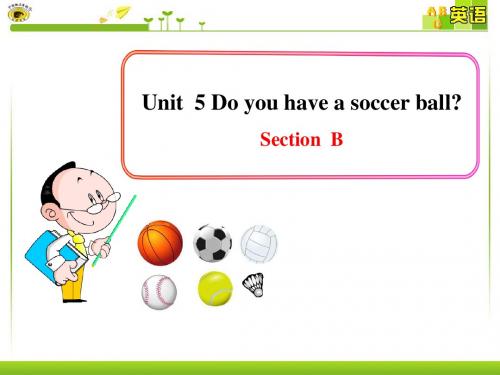
3. ——咱们打网球吧。 ——那听起来不错。 sounds good Let’s — _____ play tennis. —That _______ ______.
4. ——玛丽有两本词典吗?——是的,她有。
Does —_____Mary _____ two___________? —Yes, she _____ . have dictionaries does
F 4. I only watch sports on TV. 5 Soccer is not easy for me. 6. My brother and I are in the same school. √
G √
W
√
Practice
I. 句型转换 1. I have a soccer ball and a volleyball.(改为否定句) don’t have I _____ ______a soccer ball or a volleyball. 2. His brother has a baseball.(改为一般疑问) Does _____ his brother ______ a baseball? have
句型展示
1. 我没有足球,但我哥哥艾伦有。 I _______ _______ a soccer ball, but my brother Alan don’t have _______. does 2. 我们在学校里跟朋友踢足球。 We _______ soccer at school _______ our friends. play with 3. 我仅在电视上看它们。 I only _______ them _______ TV. Watch on 4. 我跟我弟弟在同一所学校。 in the same My brother and I are _______ _______ _______ school.
新目标英语七年级(上)Unit5重难点讲解
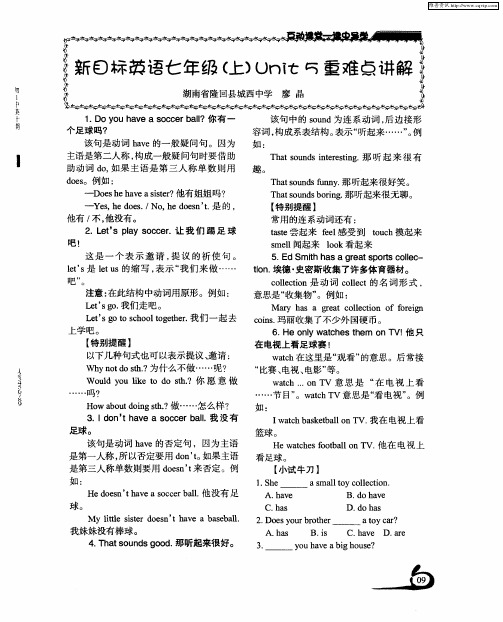
Y , e e. N , e ent . sh os/ o h os ’ 是 的 , e d d . 他有 / , 不 他没有 。 2 L tSp ys ce. 我 们 踢 足 球 . e’ l o c r 让 a 吧! 这是 一 个表 示 邀请 , 提议 的祈 使 句 。 l ’ 是 l S e S e U 的缩写 , 示 “ t t 表 我们来做 …… 吧 ” 。 注意: 在此结构中动词用原形。例如 : Lt . e’ g 我们走吧。 so e ’ g ho tgt r我们一起去 LtS o o co loe e. ts h 上学 吧 。 【 特别提醒 】 以下几种句式也可以表示提议 、 邀请 : Wh n t o t.为什么不做……呢? y od h? s wol yu l et d t. 愿 意 做 u o k os ?你 d i o h
—
该 句 中的 su d为 连 系 动 词 , 边 接形 on 后 容词 , 构成系表结构。 表示“ 听起来 ……” 例 。 如: T a su d i e sn. 听起 来 很 有 ht o sn r t g 那 n te i 趣。 T asu d f n . hto su y那听起来很好笑 。 n n T asu d oig那 听 起来很 无 聊 。 hto s r . n b n
维普资讯
适
】 毪 } . ) 斯0标英语七年级( u i 重难 讲解 莲 上) n亡
.
湖南省隆回县城西 中学
, 也 也 岛 窜 窜 也 也 也 岛 窜 窜 窜 岛 牢 也 岛 岛 窜 岛 岛 岛 岛
廖 晶
也 也 也 也 也 岛 窜 窜 肇 窜 窜 也 也 也 窜 窜 窜 七
— —
2 Do sy u r t e e o r oh r b
新目标英语七年级上unit_5_Do_you_have_a_soccer_ball(全课件)
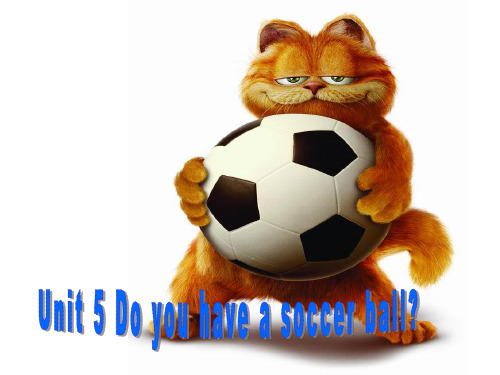
1
4
2
5
3
6
Let’s play sports! Do you play tennis? Do you play volleyball? We have many sports clubs: basketball, ping-pong, soccer, and more!
1) play sports
B: That sounds good.
A: Let’s(让咱们) play volleyball. B: I don’t have a volleyball. A: Well, let’s play soccer. B: That sounds good/interesting/fun…
Do you have a basketball?
Does he have a/an…? Yes, he does. No, he doesn’t.
Does she have a …? Yes, she does. No, she doesn’t .
Does he have a …? Yes, he does.
No, he doesn’t.
Let’s play soccer. I don’t have a soccer ball. Let’s play … That sounds good.
Let’s play basketball.
Let’s play ping-pong. Let’s play tennis.
Let’s play baseball.
A: Let’s play basketball. (let’s=let us) B: I don’t have a basketball. A: Well, let’s play ping-pong.
人教版新目标英语七年级上册 第五单元第二课时 教学课件
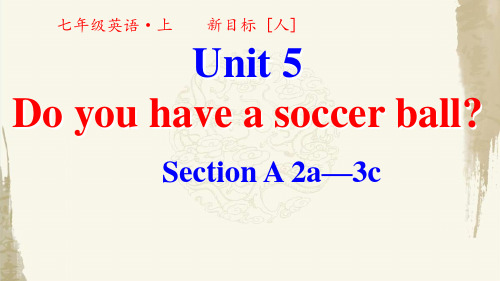
Unit 5 Do you have a soccer ball?
Section A 2a—3c
ping- pong ball
soccer
ping- pong bat baseball bat tennis bat
basketball
volleyball
tennis
Listen to the conversations and number the pictures [1-4].
学生课堂行为规范的内容是:
按时上课,不得无故缺课、迟到、早退。
遵守课堂礼仪,与老师问候。
上课时衣着要整洁,不得穿无袖背心、吊带 上衣、超短裙、拖鞋等进入教室。
尊敬谢老师,服谢从任课老师大管理。 家
不做与课堂教学无关的事,保持课堂良好纪 律秩序。
听课时有问题,应先举手,经教师同意后, 起立提问。
上课期间离开教室须经老师允许后方可离开。
let为使役动词,后加宾语接动词原形做宾语补足语,即“Let sb.do
sth.” ,意为“让某人做某事”,改为否定句时在do前加not,即“Let
sb.not do sth.”,意为“让某人不要做某事”。
Let’s have a rest.咱们休息一下吧。
☆考点辨析☆
let’s,let us
let’s
第三人称单
B: No, he _d_o_e_s_n_’_t_.
数(John, he)
A: _D_o_e_s_ he have a ping-pong bat?
用does
B: Yes, he _d__o_e_s_. I think he has a ping-
pong ball, too.
2012新目标七年级(上)备课资源 Unit 5
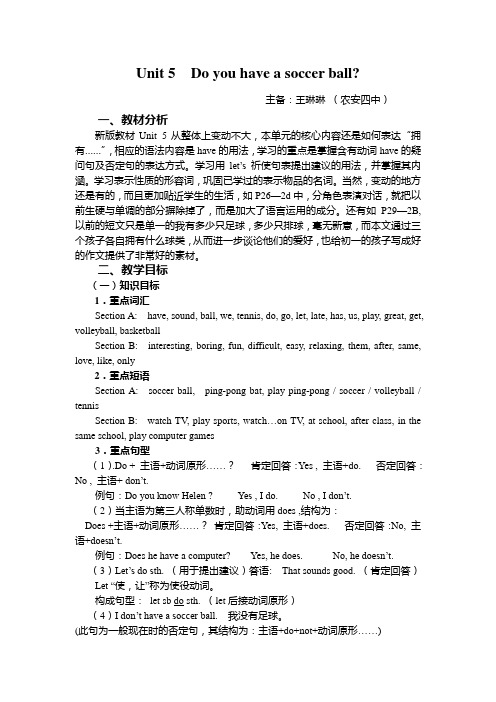
Unit 5 Do you have a soccer ball?主备:王琳琳(农安四中)一、教材分析新版教材Unit 5从整体上变动不大,本单元的核心内容还是如何表达“拥有……”,相应的语法内容是have的用法,学习的重点是掌握含有动词have的疑问句及否定句的表达方式。
学习用let’s祈使句表提出建议的用法,并掌握其内涵。
学习表示性质的形容词,巩固已学过的表示物品的名词。
当然,变动的地方还是有的,而且更加贴近学生的生活,如P26—2d中,分角色表演对话,就把以前生硬与单调的部分摒除掉了,而是加大了语言运用的成分。
还有如P29—2B,以前的短文只是单一的我有多少只足球,多少只排球,毫无新意,而本文通过三个孩子各自拥有什么球类,从而进一步谈论他们的爱好,也给初一的孩子写成好的作文提供了非常好的素材。
二、教学目标(一)知识目标1.重点词汇Section A: have, sound, ball, we, tennis, do, go, let, late, has, us, play, great, get, volleyball, basketballSection B: interesting, boring, fun, difficult, easy, relaxing, them, after, same, love, like, only2.重点短语Section A: soccer ball, ping-pong bat, play ping-pong / soccer / volleyball / tennisSection B: watch TV, play sports, watch…on T V, at school, after class, in the same school, play computer games3.重点句型(1).Do + 主语+动词原形……?肯定回答:Yes , 主语+do. 否定回答:No , 主语+ don’t.例句:Do you know Helen ? Yes , I do. No , I don’t.(2)当主语为第三人称单数时,助动词用does ,结构为:Does +主语+动词原形……?肯定回答:Yes, 主语+does. 否定回答:No, 主语+doesn’t.例句:Does he have a computer? Yes, he does. No, he doesn’t.(3)Let’s do sth. (用于提出建议)答语: That sounds good. (肯定回答)Let “使,让”称为使役动词。
人教新目标七年级英语上册电子课本(2012版)

人教新目标七年级英语上册电子课本(2012版) 新概念少儿英语轻轻松松学英语Unit 1 My name’s Gina.Language Goals: Introduce yourself;Greet people;Ask for and give telephone number语言目标:介绍自己;问候他人;询问和告知电话号码1aWrite English words for thethings in the picture.写出图中物品的英文名称。
1b Listen and number the conversations[1-3].听录音,为对话编号。
□A: What’s your name? □A: Good morning! □A: Hi. My name’s Gina.B: Alan. B: I’m Cindy. B: I’m Jenny. Nice to meet you! A: Hello, Alan. I’m Ms Brown. B: Hello, Cindy. I’m Dale. A: Nice to meet you, too.A: Nice to meet you!1c Practice the conversations above with your partner. Then greet your classmates. 练习上面的对话,然后问候你的同学。
1新概念少儿英语轻轻松松学英语2a Listen to the conversations and number the pictures [1—4].听对话,为图片编号。
2b再听一遍录音,圈出你听到的名字。
2c Practice the conversations in pairs.A: Hello! What’s your name A: What’s his name? B: My name’s… B: His name is…A: I’m… A: And what’s her name? B: Nice to meet you! B: Her name is…2d Role play the conversation. 分角色表演对话Linda: Good afternoon! My name’s Linda.Are you Helen?Helen: Yes, I am. Nice to meet you, Linda.Linda: Nice to meet you, too. What’s hername?Helen: She’s Jane.Linda: Is he Jack?Helen: No, he isn’t. His name’s Mike.2新概念少儿英语轻轻松松学英语3a Put the words in order to make conversations. Then practice them.调整词序,组成对话并练习。
七年级英语上册 Unit5 What sport do they play Section A 2课件 人教新目标版
Unit 5 Do you have a soccer ball? Period 2 ( 2a,2b, 2c,3a,3b,4)
Listening(2a:P26)
3
1
4
2
Listen again (2b:P26)
Who has the best memory?
Have 当动词“有”的意思时, 句式是: 陈述句:I have a nice bag. 疑问句:Do you have a nice bag?
Yes, I do. No, I don’t. 否定句:I don’t have a nice bag.
have与其它的词组合成词组、短语, 就不表示 “有”了,其意思与后面的 名词接近。如:
ping-pong bat
×
No, I don’t. I don’t have a ping-pong bat.
Do you have a bike ?
×
bike
No , I don’t . I don’t have a bike.
Let’s practice! Do you have a/an…? Yes, I do. /No I don’t. I have a … Let’s play soccer/basketball/volleyball.
Do you have a watch? 你有手表吗? 主语have是英语中很有用的动词, 基本含义是“有”。如课文中的I have a soccer ball. have 在he, she, it 后面要变成has。
即:一般现在时态第三人称单数形式。 如: He has a basketball.
Yes, he does. Yes, she does
英语人教版七年级上册新目标英语七年级(上)第五单元教案
新目标英语七年级(上)第五单元教案Unit 5 Do you have a soccer ball?Language goal(教学目标): Ask and answer the questions about ownership.nguage knowledge to be needed(所需知识):(1).Words, expressions & language structures that students have learned:do, you,baseball, yes, no, I, computer game,don’t , your ,brother,one he.This is my friend John. Nice to meet you!(2).Words, expressions & language structures that students have to be learned:have, tennis, racket, tennis racket, baseball, bat, volleyball, basketball, TV, does, doesn’t=does not. let us, let's=let us, play, well, sound,good,welcome,our,sport,center,like,we,many,club,ping-pong,morejoin,class, interesting, boring, fun, difficult, relaxing, watch, watch TV, has,collection,but,play, sports, only, them, small, every, day, every day.Do you have a baseball? Yes, I do./ No, I don’t.Does he/she have a tennis racket? Yes, he/she does. / NO,he/she doesn’t.Let’s watch TV,that sounds great.Situation designing(语言情景设计):sports on the playground.Anticipative results(预期效果):基本掌握Teaching periods(课时计划):Period 1: Page15 Period 2: Page16-17Period 3: Page18 Period 4: Page19-20Period 1 Time: 45’教学目标:Word goals: have, tennis, racket, tennis racket, baseball, bat, volleyball, basketball, TV. Language structures:Do you have a baseball? Yes, I do./ No, I don’t.教学内容:Section A 1a, 1b, 1c教学程序:(Teaching procedures)。
人教新目标英语2012新版七年级上Unit 5 Period 2练习
Unit 5 Period 2 (Made by Chen Liqin)一.请根据句意及首字母提示完成单词。
1.The story s interesting.2.My mother l sports very much.3. My friend John h a ping-pong ball.4.---Do you like English? ---No, I think it is very d .5.I don’t h a basketball. Let’s play soccer.6.I am Bob. My s name is Maria..7.Please b your dictionary here tomorrow.二.连词成句。
1.go, play, and, let’s, tennis .2.does, Julia, baseball, a have ?3.has, bats, ping-pong, two, she .4.not, they, do, a, have, basketball .5.are, photos, these, his ?三.句型转换。
1.I have some computers.否定句:I computers.一般疑问句: computers?肯定回答: ,I . 否定回答:,I .2.My baseball is under the bed.(就划线部分提问) baseball?3.He has a ping-pong bat.(改为复数句) ping-pong .4..Alice has a dictionary. 否定句: Alice a dictionary.一般疑问句: Alice a dictionary?肯定回答: , she . 否定回答: , she .5.Cindy has a baseball.(就划线部分提问) Cindy ?四.用所给词的适当形式填空。
人教版新目标版七年级英语上册 Unit 5 Do you have a soccer ball?第2课时 Section A2a—2d教案
录音机、磁带、课本,教学案
知识
链接
法
情境教学和合作学习法。
教学过程
Step 1 Warming up and lead-in
T:Do you have a pen ?
S1: Yes, I do
T: Do you have a baseball?
S1:Do you have a cup?
S2:Yes,I do
S1:Do you have a soccer ball?
S2:No, I do
3.After doing this, devide the class into two groups, Make conversations in groups
S1:No ,I dont’
T:How many sports things do you know?
Ss:Basketball,baseball/…
2. In this procedure, students will learn how to talk about ownership
Ask two students to work in pairs like this
T:Look at the pictures in 2b and name them. What are these?
(Point at the baseball, basketball,volleyball,football.)
Ss:They are…
T:There are four children in the conversations. Who are they? Please listen and find the answer.
- 1、下载文档前请自行甄别文档内容的完整性,平台不提供额外的编辑、内容补充、找答案等附加服务。
- 2、"仅部分预览"的文档,不可在线预览部分如存在完整性等问题,可反馈申请退款(可完整预览的文档不适用该条件!)。
- 3、如文档侵犯您的权益,请联系客服反馈,我们会尽快为您处理(人工客服工作时间:9:00-18:30)。
Grammar Focus:
Do you have a baseball? Yes, I do./ No, I don‘t. I have a volleyball. Do you have a ping-pong bat? Yes, I do./ No, I don‘t. I have a ping-pong ball. Do they have a basketball? Yes, they do./ No, they don‘t. They have a volleyball. Does she have a tennis ball? Yes, she does./ No, she doesn‘t. She has a baseball. Does he have a soccer ball? Yes, he does./ No, he doesn‘t. He has two ping-pong bats.
e
1b Listen and circle the words you hear.
ping-pong bat
volleyball
soccer ball
ping-pong ball
Listening
A: Do you have a ping-pong bat?
B: Yes, I do. A: Do you have a ping-pong ball? B: No, I don’t.
Does A:_____ John have a soccer ball? doesn't B:No,he ______. Does A:_____ he have a ping-pong bat? does B:Yes,he ____.I think he has a ping-pong ball,too. A:Hmm...Let's ask.
Review: 1. —Let’s play ping-pong. —______ A. No, I don’t. B. That sounds interesting. C. OK! It’s boring. 2. —______ your father have a car? —Yes, he ______. A. Does; do B. Do; does C. Does; does 3. They ______ some clubs at school. A. have B. has C. are
Fill in the blanks with do, don’t does or doesn’t
Does 7. ______your father have a car? doesn't No, he_______ . Do 8. ___ Lin Tao and Yang Ming have a bat? don't No, they __________ . Does 9. _____ Alan have and apple? does Yes, he ____ . Do 10. ___your father and mother have a son? do Yes, they_____.
1a Match the words with the pictures. a 1. tennis ball __ a
2. ping-pong bat __ f 3. soccer ball ___ c
b
d
c
e 4. volleyball ___ d 5. basketball ___ b 6. baseball bat ___ f
2a. Listen to the conversations and number the pictures [1-4].
ቤተ መጻሕፍቲ ባይዱ
3
Jane
4
Dale
paul
2
Mike
Tapescripts
soccer ball A: Do you have a ___________, Paul? B: No, I don’t. A: Does your brother Alan have one? Yes, he does. B: _____________.
※
2c Ask and answer the questions:
Does she/he have a/an …?
Yes, she/he does. No, she/he doesn’t .
2d Role-play the conversation. Cindy: Hey, Helen, let‘s go! We're late! Helen: OK. Cindy: Do you have the baseball? Helen: Yes, I do. It's in my bag. Cindy: And where's our baseball bat? Helen: Bill has it. Cindy: Oh, yeah. And do you have your jacket? Helen: Oh, no, I don‘t. It’s on the chair. Let me get it. Cindy: And your hat, too! Helen: Ok, I have my jacket and hat. Let's go!
Fill in the blanks with do, don’t does or doesn’t
Do 1. ____ you have a soccer ball? do Yes, I ______
Does 2. _____ Dave have a tennis racket? doesn't No, he_______. Does 3. _____your sister have a volleyball? does Yes, she_____. Do 4. _____they have a TV? do Yes, they____ .
3a Write each word in the correct place in the chart.
I do does we they
he you she Eric
it
3b Fill in the blanks with do or does A:____ you have a baseball? Do B: Yes,I ______ do A: Great! I have a bat.Let's play!
3b Fill in the blanks with do or does
A:_____ your______have a basketball? Do friends do B:Yes ,they___.They have two basketballs. A:Well,let's play basketball. B:That sounds good.(听起来很棒)。
John
※
A: Hi, Mike. B: Hi, John. A: I want to play __________. basketball basketball Do you have a __________? B: Yes, I do. A: ______!. Great
play+球类 : 打…球 play basketball 打篮球 play soccer/football 踢足球 play volleyball 打排球 play tennis 打网球 play ping-pong 打乒乓球 play the piano 弹钢琴 play the guitar 弹吉他 play the violin 弹小提琴
※ sound 联系动词(简称‘系动词’) “听起来” 其后接形容词或名词构成系表结构 That sounds like a good idea. (接名词) That sounds great /good /interesting /nice /boring /fun /difficult. (接形容词)
Dale
volleyball A: Do you have a __________, Dale? B: ____________ . But my brother does. No, I don’t Let’s go and find him.
let sb do sth 表示建议,“让某人做某事” 让我看电视。 Let me watch TV. 我们踢足球吧。 Let us (Let’s ) play football. 注意:回答Let‘s go.可以用
